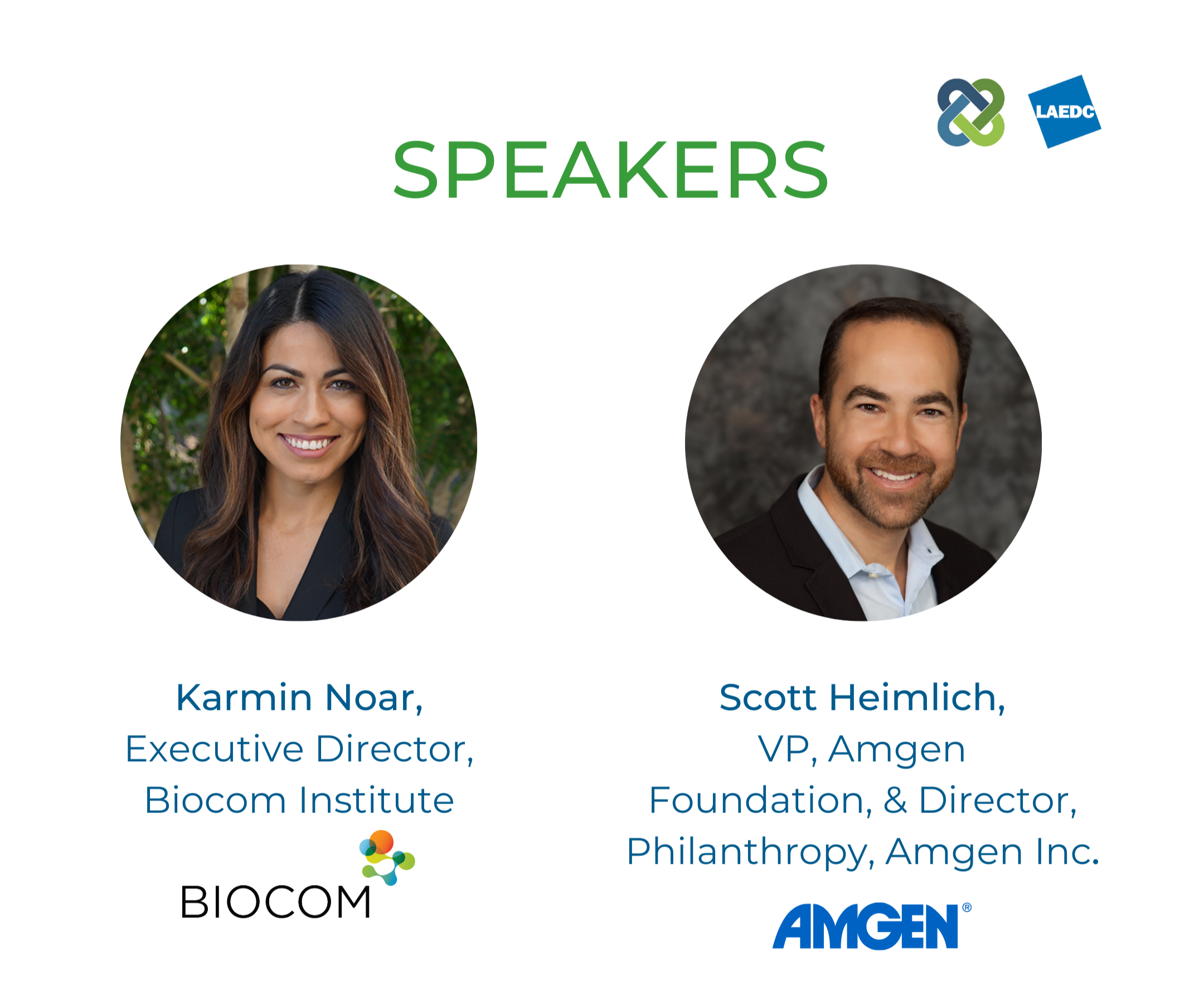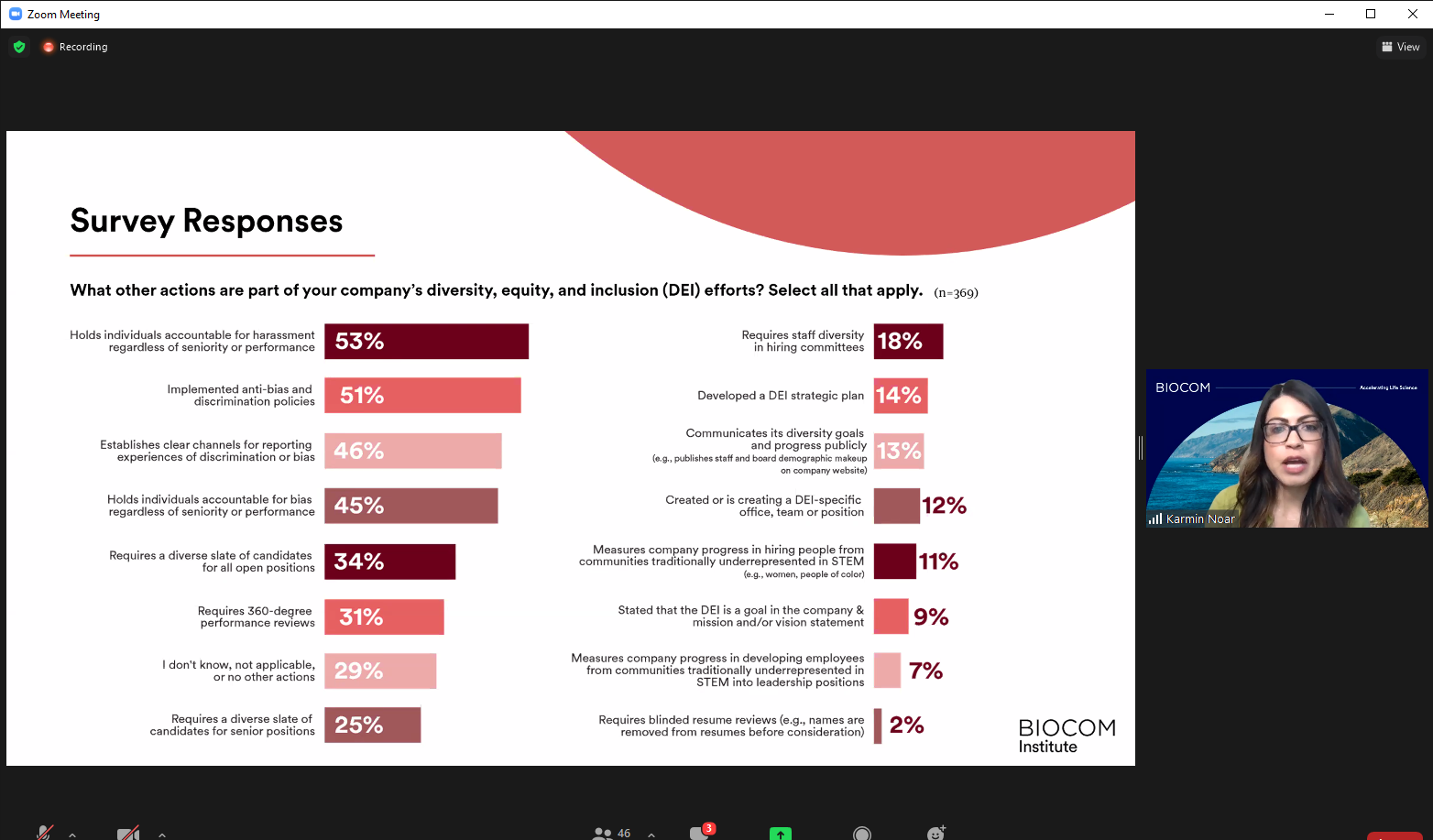The LAEDC Bioscience Industry Council Meeting convened on February 25th, 2021
This meeting featured speakers offering insights on talent needs and adaptations in Los Angeles.
The industry council is focused on workforce development, by connecting SoCal bioscience businesses with educational institutions to create better career pathways, with a focus on equity. Hosted by LAEDC and sponsored by Center for a Competitive Workforce, this meeting brings together industry executives and talent development professionals to discuss future needs and opportunities.
The meeting began with announcement of an exciting new resource: LAEDC has officially launched the LAlifescience.org website. Its interactive map showcases regional assets and bioscience activity, to serve an audience of bioscience and lifescience businesses, entrepreneurs and talent considering locating and working in LA. The search tool allows you to see layers of great data, such as who has received NIH funding, and the location of companies, colleges, incubators, and other assets with pins on the map. It also has a bioscience event calendar and facilitates connections in the industry. The website was a collaborative effort of LAEDC, CCW, Biocom, and City of LA Mayor’s Office.
LAEDC’s Bob Machuca talked briefly about the LAEDC business assistance program, a team of professionals that meet one-on-one with businesses at no cost, to navigate the resources in LA County, helping companies locate, expedite permitting, find workforce and access other services.


Karmin Noar of Biocom discussed DEI initiatives in LA County and a survey of Lifescience employees in the region to ascertain how well their companies are bringing diversity into the workforce. Her remarks make it clear that companies aren’t tracking and analyzing the data as much as possible, leading to best practice recommendations:
- Communicate company goals on DEI with internal teams, and add those discussions to strategy and business goal discussions. This includes adding a DEI component to vision/mission statements
- Incorporate DEI practices, like blind resume reviews, into HR processes
- Establish a DEI strategic plan for the company
- Implement formal DEI programs and training and work to encourage DEI staff advancement/promotions
The new study provides a benchmark and creates a platform to advance progress for a more welcoming and inviting industry for a more diverse workforce.
Karmin also mentioned the new Biocom Career Lab for job seekers and students, and the Life Science XP Education Symposium, April 28-29, 2021.
Scott Heimlich of Amgen Foundation spoke about the goal of giving more people from all backgrounds and demographics a chance to experience the life science industry, engage in science in ways that will promote lifescience literacy and an understanding of the work of the companies like Amgen to create interest in careers. He discussed Labxchange.org which is a platform to offer assets like curated articles on current topics in bioscience, lesson plans for teachers, and includes detailed lab experiment projects for learning new concepts in bioscience. This is focused on workforce development and giving free exposure to foundational concepts that will train and improve performance of people interested in the field. Topics range from CRISPR and genetics, to Gel Electrophoresis techniques, and many more topics. There are also stories on the website profiling how people of color have entered the bioscience industry, so readers can see how others have successfully entered this field for a career. The platform is new and free.
LAEDC’s Jessica Ku Kim moderated a panel of experts on the topic of how the workforce and related processes have adapted this year during COVID, how companies are approaching DEI, and the skills needs that colleges can help support with curricula.
Karen Glenn of Grifols talked about the company’s work on hyperimmune blood plasma treatments for COVID and other plasma innovation and therapies that the company develops, at its large location near East LA. Karen talked about the balance they have between remote work and lab work during the pandemic, and the company looked for new ways to help develop talent, such as providing employees with access to free online university courses to invest in its workers. “As we grow our workforce, 50% are manufacturing technicians.” Grifols benefits from long-term employees with relationships and knowledge that help build the skillsets of new employees, because knowledge transfer is key. On the topic of DEI, she said they do a lot to remove bias at Grifols, and the company was included in Bloomberg’s equality index based on the processes and investment that have resulted in a diverse workforce at Grifols. Karen noted that they prioritize K-12 exposure to science to help get people thinking about it early in their academic experiences, to help strengthen the talent pipeline. “You can never start too early,” she said.
Adam Baldwin of Provivi talked about the company’s crop protection products made in LA, which use pheromones to confuse bugs so they can’t breed and destroy crops. This is a much safer solution for human health and the ecosystem than traditional pesticides. Provivi has recognized that its people need more help on the technology front during this past year of COVID. The remote workplace has created a great need for better communication skills to keep teams on the same page. The company has grown to over 100 employees in five years, and the company has been learning a lot about how to improve DEI in its hiring and workforce practices, and emphasizes listening to employees, including the employee-led DEI committee, which address pay, hiring and promotions to address bias and address the goal of a diverse workplace. In terms of in-demand skills, Adam said you can train bench skills pretty quickly, but during COVID when students aren’t in the lab can try new ways to stay up-to-date, by reading papers, adding math skills, and other independent study. The hiring challenge that Provivi is experiencing is related more to passion, because young companies need that drive. And he said, “It’s OK to be a scientist,” meaning that not everyone needs to strive for management, because they need bench scientists who want to be bench scientists – in other words people who want a career in that role. Adam talked about the growth potential in synthetic biology, and mentioned Francis Arnold’s work (Caltech). The skillsets they will need in five years will require adeptness in the “remote workplace” because Adam doubts they will go back to having people in the office full-time. The current students are becoming very practiced in a blend of remote work. “Metabolic engineering is going to be big and we need people with education in that subject.”
Jacob Berlin of Terray Therapeutics described the company as a venture backed startup, working on chips that can screen compounds to do work like drug discovery on a massive scale, on projects related to immunology and pharmaceuticals. As a 25-person company, they navigated COVID by using strict PPE and helped transition the team to remote work. Their work is heavily data-based, which allows remote work as an efficient alternative, and furthered the remote automation of workflow. Terray has been working with the community colleges to recruit junior science positions, and he emphasized experimental design, proper use of controls and data analysis, to have strong processes and critical thinking to support valid results in the workplace. He thinks the company will be a 200 person company with more locations. “We think about what skills we will need in five years. Data science data modeling, machine learning. We need people who understand science, can do bench work, can then code and work on the data science side, so automation experience, data science experience and wet bench experience – as we move more towards cross-functional, cross-disciplinary teams.
Richard Verches of Center for a Competitive Workforce made brief remarks to make sure people are aware of the great workforce development reports and community college resources that are available at CompetitiveWorkforce.LA, including the report on Health Services that identifies career pathways into well-paying careers in related healthcare industries.
Casey O’Neill of Biocom closed the meeting with an announcement about the upcoming LAEDC Future Forum on March 18th, on the future of medical research and treatment, with keynote speaker, bioscience visionary Patrick Soon-Shiong of NantHealth and other famous LA-based bioscience companies.
Connect with the Bioscience Council to address workforce needs or participate in the council’s work of talent development, by contacting Claire Anderson at LAEDC, who moderated the council meeting: Claire.anderson@laedc.org


